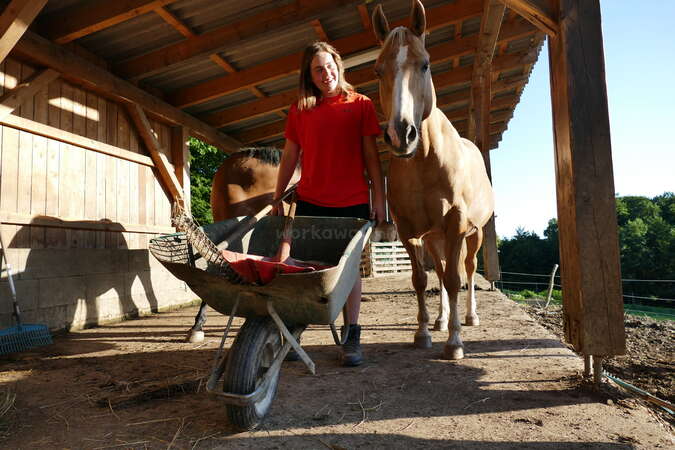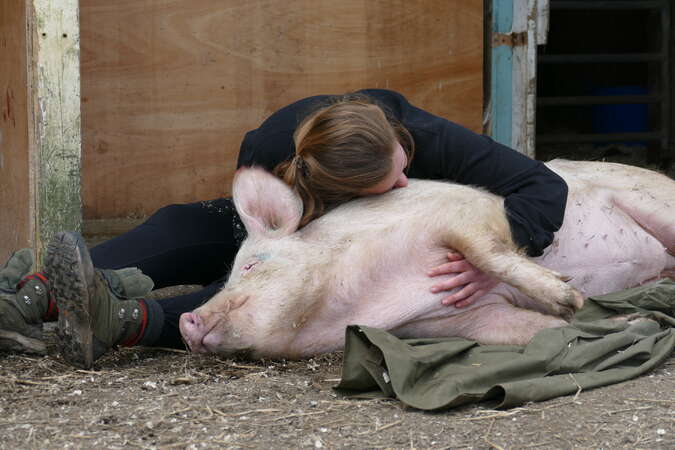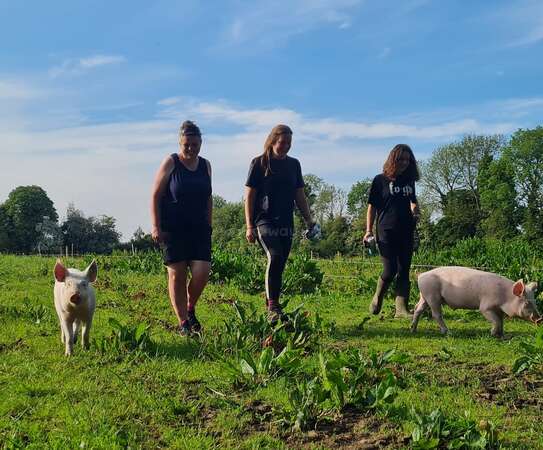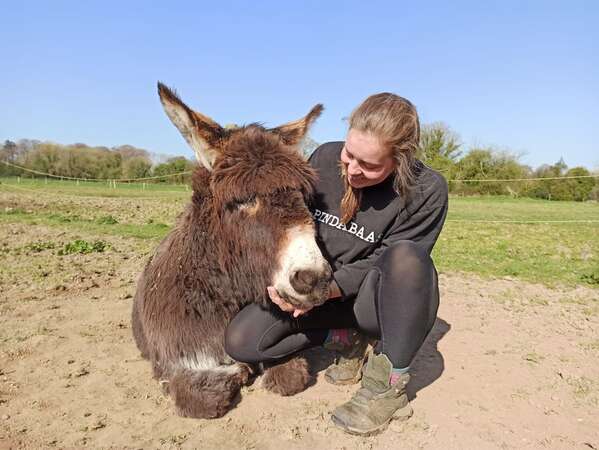Working with animals is a big dream for many people; it certainly was for me from a young age. In fact,
I often find it easier to connect with animals than people – friendly, forgiving faces and warm, welcoming cuddles from a lovable animal never fails to brighten my day!
Good thing for us animal lovers, with such a huge range of
Workaway projects to choose from, the opportunities to volunteer with animals are limitless!
Perhaps you have never worked with animals before; maybe you have some basic animal experience from childhood pets of your own; or perhaps you have worked in depth with a particular species but want to branch out and gain some experience with other animals now… During my two years of Workaway adventures, a large chunk of my hosts have involved some sort of animal care and day-to-day interaction -- so here are a few things I’ve learnt from my experiences that I’d like to share with anyone who is thinking of volunteering with animals too!
 There’s always a right host out there for you
There’s always a right host out there for you
Hear me out on this one! Animals require a lot of attention and care, in a different way to, say, a DIY-focused Workaway. For this reason,
it is important to be honest about our level of skill and experience when it comes to choosing a host.
Some points to think about: have you had experience taking care of animals you are not familiar with? Animals that might have trust or health issues, that might not be as cuddly and clean as we imagine them to be? Would you be comfortable being on your own with just the animals?
It’s easy for us all to think back to a time when we looked after a friend’s pet rabbit or dog walked an uncle’s dog – and often this type of experience is very relevant and enough to be a pair of helping hands for your host. However, in some cases, hosts might need more specialised knowledge from you, without which you might leave the animals and yourself in a situation that’s awkward at best and dangerous at worst. This isn’t a reason to feel disheartened – as I say,
there are definitely suitable animal-related hosts out there for everyone
(
over 600 on Workaway in fact!);
it’s just a matter of being understanding and finding the right place for you, based on your experience and expectations!
Which is why your profile should be an accurate description of you and what you can offer -- and if you’re not sure whether you are capable enough to handle a particular task, don’t be afraid to just ask. Being open, honest and initiating friendly communication is the best and most responsible way to find the right host.
Related blog post:
Five questions to ask yourself before your first Workaway experience!
 Not every animal is always in cuddle mode… and that’s ok!
Not every animal is always in cuddle mode… and that’s ok!
Yes,
volunteering with animals means we’re likely to get some snuggly cuddles, but we need to understand that it’s not free hugs and sunshine all the time!
One thing I’ve learned is how different every single animal can be in different environments! For example, I worked with one particular rescue pig in Ireland and, when I first got to know him, I was warned to keep a distance and be careful; I even saw him charge at a friend of mine, leaving her with a nasty leg injury. However, a month later when we reached the midst of summer, we were able to move this little guy out into the field where he could lie in the sun all day with his companion and roll about in a muddy wallow. From this moment onwards, he became one of the friendliest, cuddliest pigs I’ve ever known!

Seamus the pig! Don’t let his grouchy face scare you off from being his friend :)
Animals are, of course, directly affected by their surroundings and circumstances, so it’s impossible to ever predict how they may behave.
Even an animal you have connected and bonded with over a long period of time can still display unpredictable behaviour for unexpected reasons – something as simple as bad weather can disturb a sensitive pig or dog. Remaining somewhat reserved and respectful is essential for both your own safety and that of the animals you are working with;
patience and calmness are key.
 The bonding we form with them is like no other
The bonding we form with them is like no other
My experience is limited to Europe (so far), but even here, I have discovered a broad range of animal-related hosts. It varies a lot – from agricultural farm environments and working animal-based industries to rescue sanctuaries and rehabilitation centres. In most cases, I would definitely recommend reserving a longer period of time for your stay. After all,
animals are sensitive and need a lot of time and patience to trust a person.
For this reason, the longer you can stay with such a host, the better connection you can form with the animals there, thus enabling everyone to get the most out of the experience. Animals undoubtedly benefit from longer term Workawayers; it enables them to develop and adapt to a comfortable, efficient routine.
The longer you spend together the deeper a bond you can form; the better you can understand one another; the best level of support and care you can provide and the more rewarding your stay will be too!
Related blog post: 7 Reasons Pet Sitting is the Perfect Gig for Animal Loving Travellers
 We can really give back towards meaningful causes and animals in need
We can really give back towards meaningful causes and animals in needBefore I reach out to any projects in an animal-focused environment, here are some questions I ask myself:
Whilst travelling, I like to try to keep an open mind and consider the broader picture of my actions. It is, of course, always important to try to appreciate and understand the key cultural and lifestyle differences when we visit a new country. For example, some animal-based activities such as husky sled-racing and traditional meat farming are standard practices in many countries, and often even something that a country may rely on (e.g. for its tourist industry or another key proportion of its wealth).
That being said, when it comes to travelling as a Workawayer and volunteering for these local projects,
think about how we can potentially make a positive impact at a community level
as well. Personally, I find rescue sanctuaries to be the most fulfilling type of host. It is such a fantastic opportunity to learn about animal care and management on a very different level to what we normally read about or experience in more traditional agricultural environments. When volunteering at smaller-scale project, it's often easier to see the impact you are making and that the animals and hosts really appreciate your time; and
there’s nothing better than feeling welcome and useful whilst doing something you are passionate about.
So, when browsing through all the animal care projects around the world, perhaps think not only about what you will gain from the experience, but maybe also who your actions will benefit the most, both directly and indirectly.
There are always ways to work with animals in a meaningful way; it is just a matter of finding and aligning your own passionate views to ensure your effort is well-received.
Related blog post: A haven for dogs, cats and nature lovers: Animal Refuge on the Algarve, Portugal
There’s SO MUCH we can learn from them
I have been at my current Workaway host for 8 months now – a
vegan pig rescue sanctuary in Ireland – and, I have to say, I still learn new things every day.
The connection I’ve made with some of the pigs here is incredible, but it took a lot of time to reach this stage where we can, for example, lie together in the field or roll about in the mud.
They’ve taught me to stay patient and positive even when things don’t go as planned, and never to give up because hard work will eventually pay off. And, of course, despite all the highlights, it is important to be prepared for the downsides of animal work too. Particularly in the case of rescue sanctuaries, the sad circumstances and stories behind some of the animals does mean that not all of them will make it. This is a sad reality, but at least
if you can somehow provide a positive stepping stone in their journey then you’ve had a worthwhile impact on their life
. Sometimes you will have a bad day, but always remember to focus on the bigger picture; be positive and do your best for those you can help!
At the end of the day, if you are a true animal lover, you’re already halfway there – just keep an open mind and be aware that every experience is different and there’s always more to learn, from every single animal.
Related blog post:
Life Lessons From Travelling & Workawaying Around the World

So, if you’ve made it to the end of this post, I’d say you’re definitely interested enough to give it a go! Even if, up until now, you’ve only really worked with people, now is maybe the time to branch out and get some animal experience.
Volunteering with animals really is something I will never get bored of; it’s just so rewarding and no two days are ever the same…
I’m more than happy to talk about my travel adventures and connect with other like-minded travellers. Say hello on
Instagram, and, as always, happy workawaying!















